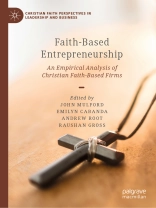This book investigates the intersection of Christian faith and entrepreneurship in the global marketplace through empirical micro-level research on various Christian-based firms in North and Central America, Asia, Europe, and Africa. It features diverse cross-cultural cases, ranging from small family businesses to large enterprises, and covers multiple industries and regions.
The book attempts to answer this research question: ‘How do Christian faith and entrepreneurship converge in the marketplace?’ Through a comparative, cross-cultural case analysis, the work identifies thematic categories of Christian faith-based entrepreneurship, extending and integrating the two conceptual areas of faith and entrepreneurship from a Christian worldview with a Judeo-Christian heritage. The selected cases this book explored enhanced the emergent model of faith-based entrepreneurship applicable across faith-based organization types and regions. This book also provides significant empirical and theoretical contributions to faith-based entrepreneurship, offering new research areas for the future research paradigm. The cases in this book delve into topics such as faith and women entrepreneurship, religion, spirituality, and social entrepreneurship, faith and family entrepreneurship, and good practices of entrepreneurship, in line with the latest trends in the field, and will be of interest to all students and researchers in entrepreneurship.
Tabella dei contenuti
Chapter 1 Introduction: Overview of the Faith-Based Entrepreneurship Research.- Part 1: Faith and Women Entrepreneurship.- Chapter 2 Converging Faith and Entrepreneurship: A Study of Auntie Anne’s.- Chapter 3 A Marketplace for the Christian Entrepreneurial Spirit: A Case Analysis of Mary Kay.- Chapter 4 Kathy Ireland – Super Model, Super Mogul, and Modern-Day Apostle.- Part II: Religion, Spirituality, and Social Entrepreneurship.- Chapter 5 Balanced Christian Social Entrepreneurs in Cambodia: Fulfilling the Triple Bottom Line and Coping with COVID-19.- Chapter 6 An Tobar Nua: The Business of Wellbeing in the Isle of Saints and Scholars.- Part III: Faith and Family Entrepreneurship.- Chapter 7 Chick-fil-A: Built on the Values and Worldview of Its Founder.- Chapter 8 El Buen Pastor Farm: Blending Entrepreneurial Mindset, Stewardship and Faith in Coffee Production and Diversification.- Chapter 9 The values-based culture and legacy of Brights Hardware: A single case study.- Chapter 10: Learning, firm policy, and performance at the Jamaica Broilers Group of Companies.- Part IV Good Practices of Entrepreneurship.- Chapter 11 Tyson Foods: Using Corporate Chaplains to Encourage Spirituality in a Diverse Workforce.- Chapter 12 Faith-Based Entrepreneurship and Benham Real Estate: Toward a For-Profit Model for Christian Mission Work.- Part V Teaching Entrepreneurial Cases.- Chapter 13 HERR’S Foods, Inc.—Production Strategy.-Chapter 14 Ascetic Entrepreneurs: A Comparative Prosopography of Conrad Hilton and Bill Marriott.- Chapter 15 Celblox- Complex Marketing Changes in a Fragmented Industry.- Chapter 16 Southern Elegance Candle Company.- Chapter 17 Conclusions and Some Future Directions for Faith-Based Entrepreneurship Research.- Epilogue.
Circa l’autore
John E. Mulford is Professor and Director of the Center for Entrepreneurship at Regent University, USA.
Emilyn Cabanda is Professor and Ph.D. in Business Program Director, School of Business and Leadership at Regent University, USA.
Andrew Root is Assistant Professor of Finance and DBA Program Director, School of Business and Leadership at Regent University, USA.
Raushan Gross is Associate Professor and Chair of Business Management and Leadership at Pfeiffer University, USA.












